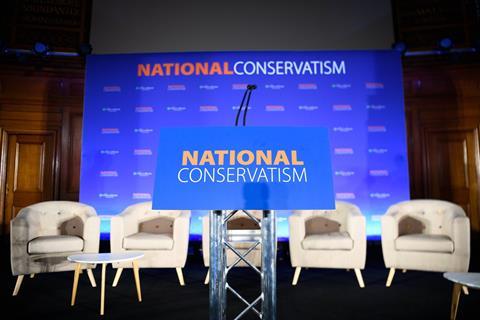Parts of the media has grossly misrepresented the aims of the National Conservative Conference, says Rhys Laverty. Having attending the event, Rhys believes it could result in conservatives putting God back into their politics

You may have seen much of the British press foaming at the mouth this week about the National Conservatism conference (NatCon, for short).
Supposedly, the event was a gathering for far-right nutjobs in the Tory party, intent on ushering in an authoritarian dystopia that will look like a cross between The Handmaid’s Tale, a Donald Trump style ‘Make America Great Again’ and a pub lock-in with Nigel Farage.
As an attendee, I can confirm it was, to a hilarious extent, nothing of the sort. If you want a textbook example of how conservatives can understand liberals but liberals can’t understand conservatives, this week has been it.
What is NatCon? Well, none of the above, as noted. And it’s nothing to do with the Conservative Party.
NatCon is a project started by the Edmund Burke Foundation, a US public affairs institute. It is a movement which recognises that our current social and political mess in the West - from deindustrialisation to the transgender craze - is the fault of an aggressive Left embracing extreme social liberalism and a useless Right embracing extreme economic liberalism while failing to combat the Left, and often embracing a good dose of its social liberalism along the way.
In response, small-c conservatives need to step back from these globalised ideologies and get back to actually conserving their countries. Hence, national conservatism.
Why, then, are many Christians (myself included) interested in and even encouraged by NatCon?
Well, for one, NatCon’s Statement of Principles recognises the historic importance of religion, and particularly Christianity, in Western public life: “No nation can long endure without humility and gratitude before God and fear of his judgement that are found in authentic religious tradition.”
Being from a low church, nonconformist, British evangelical background, I would never have imagined myself attending something like NatCon. Unlike our American cousins, modern British evangelicals are breathtakingly apolitical. Some of us have bought into the myth that the public square is neutral. But now it seems clear that a nation will in fact always have a public religion. The only question is which one. At the moment, two of the competing ideas are Wokeism and Christianity.
The Tories vs the conservatives
NatCon provided an important moment for British Christians to realise that being “conservative” and being a Tory are not the same thing.
A marked feature of the conference was the vast gulf between the establishment Tories - notably Jacob Rees-Mogg, Suella Braverman, Daniel Lord Hannan, and Michael Gove - and the other speakers. The former grabbed the headlines (understandably), but it was the speeches and panel discussions of the latter that were really worth the price of admission.
The panel speakers were full of truly conservative thinking about things like family, gender, tradition, religion - that is, they wanted to conserve those things. They continually lambasted the utter failure of 13 years of Tory rule to do so. To their credit, Tory backbenchers Miriam Cates and Danny Kruger (both fellow evangelicals) also gave truly conservative addresses about family and childrearing.
Given this rich offering of conservative thought, many suffered whiplash when, for instance, Michael Gove - the only consistent face of 13 years of Tory rule - appeared on stage. Most of the conference was an evisceration of all that he has presided over.
Heavy on diagnosis, light on solutions
NatCon featured an abundance of diagnosis of our current cultural and political problems - both on the Left and the Right.
Suggested answers weren’t exactly few and far between, but the conference was not brimming with them. The most worthwhile answers were usually merely principled gestures in the right direction, with a few specific tips: truth will out, study history properly, prepare to lose friends, find a proper community, join the Free Speech Union.
Yet we must start somewhere. The scandal of the British conservative mind is basically the same as what Mark Noll said about the evangelical mind: there isn’t one (not anymore, at least).
A body in search of a soul
A fundamental question overshadowed proceedings: what is the role of religion and Christianity within the future of British conservatism?
Of course, this question strikes many as ludicrous. British politics doesn’t do God, and so a movement emphasising religion and Christianity just won’t fly here.
I do not pine for any “Good Old Days” in British public life. But it is undeniable that Britain has lost both a sense of social cohesion and at least the expectation of virtue among our leaders, if not its consistent existence. In less than 60 years, we have gone from John Profumo bowing out of public life entirely after the Profumo affair to Matt Hancock appearing on I’m a Celeb. This cannot be detached from the decline of British Christianity. So it is entirely sensible to ask: is the moral renewal which British conservatives desire at all possible without a revival of the Christian beliefs which created the very things they wish to conserve?
Whilst acknowledging Christianity’s historic role in once forming Britain into a basically cohesive nation with a relatively (and again, I stress relatively) virtuous leadership class, NatCon’s secular conservatives had basically no answers here (though I heard at least one concede that, whilst agnostic themselves, religious revival is probably our only hope). But largely they wanted moral law with no moral lawgiver. To any religious believer present, they displayed a Boris Johnson level of metaphysical cakeism.
Is moral renewal possible without a revival of the Christian beliefs which created the very things conservatives wish to conserve?
NatCon has, I hope, begun to build a new body of British conservative thought. I was far from agreeing with all that was said, but there were good people there, contending sincerely for the things that make up a healthy society. But it is, at present, a body in search of a soul, matter in search of form, true opinion in search of knowledge. And I do not say that as a condemnation, merely as an observation. It is my sincere hope that it finds what it is looking for.
British evangelicals have long been lulled into the belief that, when it comes to politics, the choices are either secular liberalism or oppressive theocracy, and we have been conditioned to affirm the former as the obviously God-ordained option on this side of Christ’s incarnation. However, this is a dichotomy which an increasing number are refusing. It’s both historically ignorant and socially disastrous. Church history offers us numerous ways of working this out that do not involve the kind of religious coercion, legalism, and lethal spiritual nominalism which evangelicals (rightly) fear.
There is an ultimate spiritual dichotomy in politics though - one which British evangelicals have tried to dodge just as much as secular conservatives. But it quite simply can’t be done. The real two options are even starker than liberalism or theocracy, and British evangelicals must begin reckoning with this if we are to love our neighbours as we are called to do. Sebastian Morello put it perfectly, and for this line I award him the NatCon Goal of the Tournament: “The choices remain: nihilism or God”.
This article was originally published on The New Albion and is re-used with permission


































No comments yet